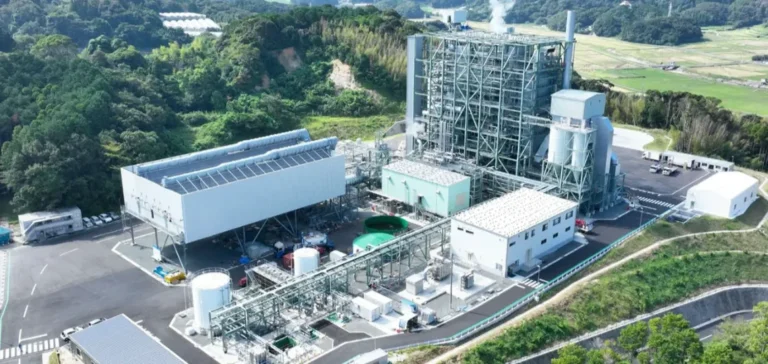Japanese company Renova announced on September 30 the commercial commissioning of the 49.9-megawatt (MW) Karatsu biomass power plant, located in Karatsu City, Saga Prefecture. The plant, originally scheduled to begin operations in December 2024, experienced multiple delays before becoming operational on September 27, 2025.
The project was transferred from the feed-in-tariff (FIT) scheme to the feed-in-premium (FIP) mechanism to allow the signing of a fixed-price power purchase agreement (PPA) with an undisclosed offtaker. When certified in 2017, the facility qualified for a tariff of JPY24 per kilowatt-hour for 20 years under Japan’s FIT programme for large-scale biomass plants.
A project financed by four industrial partners
The plant is expected to generate around 350 gigawatt-hours per year using imported biomass, primarily wood chips and palm kernel shells (PKS). The special purpose company (SPC) Karatsu Biomass Energy LLC, which owns the project, is held by Renova (35%), Toho Gas (34%), JA Mitsui Lease (16%), and INNOCENT (15%). Renova holds a purchase option for JA Mitsui Lease’s stake.
The final investment decision was made in August 2021, and construction began in the same month. The original completion date was postponed to March 2025 before being pushed back to September 2025. Engineering, procurement, and construction (EPC) were handled by Nippon Steel Engineering, while Kansai Electric Power served as owner’s engineer.
Renova expands its biomass portfolio
Karatsu is the seventh biomass facility developed by Renova, bringing the company’s total installed capacity to approximately 445 MW, unadjusted for ownership share. It follows the 75 MW Omaezaki Port biomass plant, commissioned in January 2025 in partnership with Chubu Electric Power and other stakeholders.
Toho Gas, one of the project’s key partners, has also increased its involvement in the sector with a 10% stake in the 112 MW Tahara biomass power plant, commissioned in September 2025. The growing interest from Japanese utilities in such assets is tied to the revenue stability offered by long-term PPAs under the FIP scheme.






















